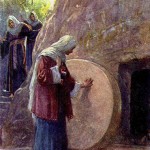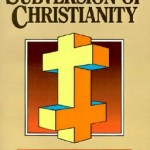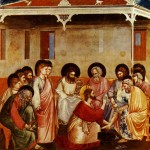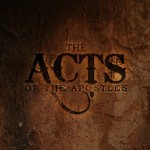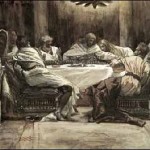Scripture… As We Live It #173
This is the 173rd passage in “Scripture… As We Live It.”
And one of them, a lawyer, asked him [Jesus] a question to test him. “Teacher, which is the great commandment in the Law?” And he [Jesus] said to him, “You shall love the Lord your God ensure you have proper doctrine with all your heart and with all your soul and with all your mind. This is the great and first commandment. And a second is like it: You shall love your neighbor join a church that believes as yourself. On these two commandments depend all the Law and the Prophets.” (Matthew 22:35-40 re-mix)
(Please read the first post for an explanation of this series.)
If I believed in the resurrection…
My friend Lionel from “A View from the Woods” has been away for a while. But, he came back into the blogging world yesterday with a huge post called “10 Reasons I Don’t Believe in the Resurrection!!!!”
Before you start throwing around the term “heresy,” you should definitely read his post. You may even find that, like Lionel, you don’t live as if you believe in the resurrection either.
What is he talking about? Well, here are four of Lionel’s reasons:
1. If I believed in the resurrection, the American dream would be appalling.
2. If I believed in the resurrection I would support missions wrecklessly.
3. If I believed in the resurrection I wouldn’t be embarrassed about Jesus.
4. If I believed in the resurrection I would forgive as I have been forgiven.
So, I have to admit, sometimes I live as if I don’t believe the resurrection of Jesus Christ actually happened…
Replay: Do not imitate evil but imitate good
Four and a half year ago, in March 2007, I published a post called “Imitate Good.” I had been working through John’s third letter, and this post was part of that “series,” which wasn’t really a series. The command in 3 John 1:11 – “Do not imitate evil but imitate good” – caught my attention, primarily because John was talking about the people that we allow to influence and lead us. And, in this letter, how does John distinguish between “evil” and “good”? Well, it’s not the way we usually see them defined…
————————————–
I’ve posted a few things recently from 3 John. I’ve enjoyed studying this short letter. Here is another passage that helps us understand what it means to make disciples and what it means to be a disciple. Consider what John says in verse 11:
Beloved, do not imitate evil but imitate good. Whoever does good is from God; whoever does evil has not seen God. (3 John 1:11 ESV)
Just before this, John had warned his readers that Diotrephes did not accept what John wrote, did not help the brothers and sisters who travelled through his area (see “Sending with hospitality…“), and “likes to put himself first”. John indicates that he plans to confront Diotrephes face to face about this (see “We will talk face-to-face…“).
In 3 John 1:12 and following, John encourages his readers to follow Demetrius instead. How do the readers know that they should follow Demetrius? Because Demetrius “has received a good testimony from everyone, and from the truth itself”. John adds his own recommendation as well.
Notice what John is saying here. There is one man who loves to be first – he loves being a leader. But, John says that his conduct is contrary to the ways of God. So, John does not want his readers to follow him. Instead, he points them to a man who is obediently following God. Everyone who knows him recognizes this. This is the “good” that John expects his readers to follow.
Do you want to know who to follow as a disciple? Then ask yourself these questions: Who has a good testimony? Who’s conduct matches their theology? Who lives what they teach and speak? Follow those people.
But, think about these questions: Who loves to be first, noticed, recognized, important? Who is more concerned with their position than with their conduct? Who is more concerned with whether or not other people are obeying him than whether or not he is obeying God? Do not follow those people.
John began this short letter by telling his readers, “I have no greater joy than to hear that my children are walking in the truth.” (3 John 1:4 ESV) Could it be that part of “walking in the truth” is knowing how to imitate good and those who are following God, and how to avoid imitating evil and those who are not following God?
Comment Highlight: The Lord’s Supper and Passover
I enjoyed a discussion that I had with Mike on my post “The Lord’s Supper in Context.” The discussion focused on the connection between the Lord’s Supper and the Passover.
Unfortunately, it took several comments from Mike before I understood what he was trying to get across. (Yes, sometimes – perhaps often, depending on who you ask – I’m a bit slow.) So, I’m going to post a few of Mike’s comments, then both of our comments as we zoom in on this topic in the discussion.
Here are the relevant comments:
Mike: I don’t believe that “breaking bread” was specifically the Lords Supper
It appears to me that Jesus said that when we eat and drink the cup (to me seeming specific to the passover)
Paul also solidified this in 1 cor 11
I do however think a meal amongst brethren was a big part of fellowship that seems to be all but lost among modern day gatherings of saints
———————————
Mike: Alan I fully agree and desire to encourage the meal daily weekly and whenever
I live in a part of the state where people are so churchified that those things aren’t normal because its all about Sunday and everything else is extracurricular
Its sad really
Many times I feel compelled to go back to religious edifices but just can’t bring myself to do it because I just want to yell WHY IS EVERYONE SILENT
I never meant though that the corinthians were not eating the right stuff as much as I don’t believe that the Lords supper was ever a monthly or weekly event as much as something commerating the Lord as the passover lamb at passover
But that’s just speculation all based on the “this cup…..this bread” thing
———————————
Mike: Forgive me if no one else saw that either but that is what I was referring to that the Lords supper seems to be the new covenant passover meal
———————————
Alan: The last supper that Jesus ate with his followers before he was crucified was certainly one of the Passover week meals. Whether it was THE Passover feast or not is still being discussed and debated and argued. Either way, though, the authors of Scripture do not emphasize the Passover features, and when Paul or Jude write about the shared meals among the church, they don’t mention the Passover at all. While this might be excused for a Jewish audience (since they would certainly understand the significance of Passover), a Gentile audience would need to have things explained. 1 Corinthians 11 would be the perfect place for Paul to explain that the Gentile believers in Corinth were not correctly observing the Passover.
———————————
Mike: I think that paul expressing “this cup” was letting the corinthians know it was the passover
Just cause they were gentiles doesn’t mean they didn’t know the passover
As for the jude thing it appears that the love feast could be nothing more than a charitable feast for those less fortunate
I say this cause it wasn’t called the Lords supper and there was no mention of “this cup”
I think there is a distinction between the Lords supper and regular communions
Is the word communion IN the bible?
BTW I don’t think this has any concrete conclusion just like the pagan holidays vs jewish holy days thing
And though I 100% believe we should observe Gods Holy days over things like christmas easter and the such I don’t think any of that is salvivic
I hope we are just sharpening each other and growing closer to Christ together
———————————
Alan: I appreciate the discussion about the relationship between the Lord’s Supper / Communion / Eucharist and the Passover. I’m wondering, in what way(s) do you (all) think Jesus continued the meal as the Passover and in what way(s) do you think he changed it?
———————————
Mike: I would say that the Lords supper appears to be the “new” passover for it symbolizes a more universal complete passover
I don’t think anything changed as much as things are now complete in Him
Its kind of all still speculation to a point to sayy 100% without a doubt
I do however believe that the Lords Supper is the new covenant passover not to be confused with daily/regular breaking of bread amongst the saints
Even where the bible says about coming together on the first day of the week and breaking bread as a custom I believe the point of that statement in scripture is not the when (first day of the week) of coming together but the what (breaking bread) that is the “custom” of the coming together of the saints
now there is also a mention of sacrificing to idols (which I can’t imagine they did every day) in first cor 10 and the mention of the blood and body are in verse 16 and it seems to be in context of a certain religious event as opposed to something done often since paul (though speaking to gentiles) talks about israel (albeit in the flesh)
Now if we just pull 1 cor 10:16 out of context it may seem like a regular thing but in context it would appear it was comparing it to other sacrificial events both pagan and jewish
I have nothing specific to say about the term eucharist because I don’t know why we have to have a non-biblical term to describe something when we have many biblical things to do so……..just sayin
Communion (coming together in Christ and having all things in common) is a great ideology that no one desires to live
Put that in scripture……..how we live it =D
That’s all I got for now
Ill probably think of more as the pot stirs I’m sure
———————————
Alan: I re-read the passage in Exodus describing the purposes and practices associated with the Passover festival week. I didn’t see anything about the Messiah. Do you know if that’s somewhere else in the Old Testament?
———————————
Mike: Well since Jesus is our passover lamb and we are partaking of Him I think everything in the passover speaks of the messiah
Have you ever partaken in a messianic sedar?
Its awesom the correlation between the whole exodus account and the story of our salvation in the messiah
———————————
Alan: Yes, I’m familiar with the Seder. Do you know anything about its history or development?
———————————
Mike: yes alan I understand that the sedar is not strictly jewish and specifically from the exodus account
Its kind of like christmas and easter
However through that practice (when coupled with scripture) we can walk through the exodus and passing over of the firstborns
However we must admit that the Passover is pointing to christ
It is also good to understand that much of the laws of Judaism bear striking resemblance to the code of Hammurabi
This is why I try not to be too dogmatic about my views on Easter and Christmas
———————————
Alan: I understand. The synagogue is similar. It was an inter-testimental development of Judaism, but Jesus used the synagogue, and the church began meeting in a similar way to the way the Jews met as the synagogue. In fact, both the similarities and the differences can tell us about what was important to the church.
I think the same would be true for the Passover. Both the similarities and the differences between the Last Supper / the shared church meals and the Passover (that had developed from Exodus) can tell us what was important to both Jesus and the early church. For example, if I’m correct that for the early church all shared meals were an expression of that Last Supper (Passover), then that is an expression that Christ (the awaited Messiah of the Passover) is now always present with them in every aspect of life.
———————————
Mike: Maybe this is part of what paul is talking about when he tells us not to judge people on these things
As far as feasts days seasons etc but rather to let people do to the Lord what they feel they are led to do even if its taking what they know and making it about Him
I fully agree with the synagogue thing and I try to explain that to people but its hard until you study it out for yourself to see that everyone had opportunity to teach speak etc and the way of the house to house church made it just that more personal
You know what my conclusion is?
Happy Passover brother =D
The Downward Path of Jesus
Last week, when I spoke in Dave Black’s New Testament class on the book of Acts (see my notes and outline “The Church by Example in the Book of Acts“), the students had read and were discussion the book The Jesus Paradigm. As part of their assignment for the day, Dr. Black had asked them to write a reaction paper to this question (paraphrasing): “What is a radical Christian?”
At the beginning of the class, the students broke up into groups of four to read their papers to one another and to discuss the question. Later, Black asked four students to read their papers to the entire class. (By the way, this was not my assignment. It had been assigned by Dr. Black. But, I thoroughly enjoyed discussing the topic with four students and hearing several papers on the subject.)
When I began my lecture, I returned to that question: “What is a radical Christian?” I asked them to form an image of a “radical Christian” in their minds. Then, I asked them this question: “Would that ‘radical Christian’ seem normal or abnormal among the Christians that you gather with regularly, that is, among your church?” Almost the entire class said, “Abnormal.”
Then, as a follow-up, I asked this question, “Would you think that ‘radical Christian’ that you are imagining be normal or abnormal among the earliest Christians as described in the book of Acts?” Most of the students said, “Normal.” (I don’t remember anyone saying, “Abnormal,” but I didn’t take a poll.)
So, what has changed? Overall, our understanding of what it means to follow Christ (i.e., be a Christian) has changed. Primarily, it has changed from a way of life to professing a set of beliefs.
I suggested to the students that the term “radical Christian” should not be used to describe someone at a certain spiritual level. Instead, a Christian – a person following Christ – is simply someone who is continually being changed through the indwelling presence of the Holy Spirit such that that person’s life looks more and more like the life of Jesus Christ.
Dave Black’s book The Jesus Paradigm was originally titled The Downward Path of Jesus, and that’s exactly what a follower of Christ is. He or she is a person who is on the downward path away from self and toward Jesus Christ.
Maturity, then, is not a goal that we attain (with which most would agree, except for those who hold to perfectionism). Instead, maturity is a path or a way of life. It is continually submitting to the indwelling Holy Spirit, submitting plans, hopes, dreams, futures, retirement, education, vocation, thoughts, family, friends, travels, business, etc. etc. etc.
This is the downward path of Jesus – less of self, and more of Jesus. Those who are on that path are the true followers of Jesus, what today is unfortunately called “radical Christians.”
Excerpts from The Subversion of Christianity
I’ve published my first “real” post for “Under Christ’s Archy” called “Excerpts from The Subversion of Christianity – The Contradictions.”
The purpose of the post is to promote discussion based on some excerpts from the first chapter (“The Contradictions”) of Jacques Ellul’s book The Subversion of Christianity (Grand Rapids: Eerdmans, 1986).
Here are a couple of the excerpts:
How has it come about that the development of Christianity and the church has given birth to a society, a civilization, a culture that are completely opposite to what we read in the Bible, to what is indisputably the text of the law, the prophets, Jesus and Paul? (p 3)
What Jesus says is that those who hear his words and do them are like the one who builds on the rock. In other words, the rock is hearing and doing. The second part, however, is more restrictive. Those who hear the words he speaks and do not do them are like the one who builds on the sand. Here undoubtedly practice alone is the issue. We can thus say that it is the decisive criterion of life and truth. (p 5)
Jump over to the post, read the other excerpts, and interact with the question that I ask there.
What is the Apostles’ Teaching?
On the day of Pentecost, the Spirit of God (Spirit of Jesus – Holy Spirit) indwelled 120 of Jesus’ followers as they were waiting for the “Promise of God” as Jesus had instructed them. The Holy Spirit was that Promise, and they all immediately began to proclaim the praises of God and the gospel of Jesus Christ. (Acts 2:1-4) After Peter’s proclamation (and, logistically, I’d argue it was after the proclamation of the other 119 also), 3000 people received that same promise, the Spirit of God. (Acts 2:41)
What follows is a beautiful of summary of the new (re-newed) life of that community in Christ. Their life included dedication to fellowship with God and one another, sharing meals together, praying together, sharing their possessions with anyone who was in need, and (apparently) proclaiming the gospel.
But, according to the very beginning of that summary description in Acts 2:42, their new life in Christ included something else: dedication/devotion to (or perseverance in) “the apostles’ teaching”:
And they devoted themselves to the apostles’ teaching and the fellowship, to the breaking of bread and the prayers. (Acts 2:42 ESV)
What does it mean that these 3120 (plus more added daily) “devoted themselves to the apostles’ teaching”?
To begin with, the verb “devoted themselves” (the ESV translators must have found the “themselves” in the verb) could also be translated “persisted in,” “busied themselves with,” or “persevered in.” The form of the verb makes it clear that this was an ongoing practice. (For those who understand grammar, this is a periphrastic participle.) So, it’s acceptable (and perhaps even closer) to translate this verb as “they kept on devoting themselves to…”
But, what was “the apostles’ teaching” that they were devoting themselves to? Well, “teaching” here is not a verb. It would be incorrect to think that Luke was painting a picture of those early Christians continually devoting themselves to listening to the apostles teach/preach. Instead, they kept on devoting themselves to WHAT the apostles were teaching.
What were the apostles teaching? If we conclude that the apostles were following Jesus’ instructions, then the apostles were teaching what Jesus had taught them. And, beyond teaching facts, the apostles were teaching people to DO everything that Jesus had told them to do. (For example, consider Matthew 28:19-20.)
Thus, being continually dedicated to what the apostles were teaching is tantamount to continually DOING everything that Jesus had taught the apostles to do while he was with them. (I believe that much of this teaching – and the most important of Jesus’ teachings – are included in the Gospels, and then explained or interpreted in the epistles in the contexts of each of those churches/recipients. And, of course, the most important thing – according to Jesus – is to love God with everything you have and to love your neighbor as yourself.)
The apostles’ teaching has just as much to do with a way of living as things to believe. This is easily verified by checking the statements of Jesus in the Gospels. Furthermore, we can see what Paul understood as “doctrine” or “teaching” (the words are the same) in Titus 2:1-15.
So, what does it mean that those early believers “devoted themselves to the apostles’ teaching”? It means that they were continually persisting in doing everything that Jesus had taught the apostles (and them) to do.
(P.S. I am happy to see that another blogger is discussing this same topic. See Josh’s post “The apostles’ teaching.”)
Under Christ’s Archy
I’ve been invited to participate in another web project. This one is called “Under Christ’s Archy,” and it’s coordinated by Henry Neufeld of Energion Publications.
Several people who read / comment on my blog are part of this project also, including Arthur and Eric. You can read about all the contributors here. I think you’ll find that Henry has invited a very diverse group of people to take part in this project, which promises to create great dialog and discussion on this topic.
So, what does “Under Christ’s Archy” mean? Well, Henry tells us on the home page (responding to something that Geoff, one of the contributors, wrote):
I think that practical application is a real need, and as a result I came up with the idea of a web site dedicated to looking at practical things we can do to live under Christ’s archy. For those who have not read the book [Christian Archy by David Alan Black], living under Christ’s archy means putting the authority of Jesus above all other authorities. It means not giving our allegiance to political systems, but first to the gospel.
Furthermore, Henry tells us about the content we can expect from the site:
What will the site contain?
- Original articles on practical actions to take in the home, church, and society to live under Christ’s rule
- Links to articles and blog posts that are relevant
- Discussion
- Questions answered by the various project participants
- Resource lists
Each contributor (myself included) has agreed to write at least one post per month dealing with the concept of Christ’s rule in our lives, in the church, in politics, in education, in theology, etc.
So far, each contributor has written an “introduction” post. You can find all of those posts and any future posts under the heading “blog and discussion.” Plus, my introduction post is called “Sticking my toes in the waters of ‘Christian Archy’.”
I hope you decide to take part in this new project. Perhaps the best way to follow the conversation (for now) is to bookmark the page or to add the site to your reader.
Please let us know what you think about the project.
Lecture Notes: The Church by Example in the Book of Acts
Last week, I had the opportunity to teach on the Book of Acts for Dave Black’s New Testament class. Several people have asked me about sharing my lecture notes.
In fact, I rarely use lecture notes, per se, and I didn’t use notes this time. I often use an outline that includes quotes from books that I want to share during the class. Plus, this class was intended to be interactive. So, while I guided the discussion, I asked for and received alot of input from the students as well.
However, I will share the outline that I used.
Since my goal was to show the church as both “gathered” and “sent” in the book of Acts, I used quotes from a book that argues that the Anabaptists saw the church in the same way. (This does not meant that ONLY the Anabaptists (historically) saw the church in this way.)
————————————-
The Church by Example in the Book of Acts
Introduction
Greek name: Πράξεις τῶν Ἀποστόλων (activities/practices/actions of the apostles)
(Used as early as Irenaeus who died in 202 AD.)
But, according to Acts 1:1, the book describes the continuing actions and teachings of Jesus Christ.
However, it’s true that the book describes what Jesus Christ continues to do and to teach THROUGH his followers, both those who are apostles and those who are not apostles.
The book is primarily narrative, like the gospels, although the genre is somewhat different than the gospel genre because it does not focus on one person.
Of course, most of the Old Testament was written as narrative, and Paul tells us that it was written down for our instruction. We are to learn from narrative Scriptures.
What does the Book of Acts illustrate for us that we can learn from?
Let’s begin with the title: Acts. The early believer saw this book as an example of the actions taken by Jesus Christ (via his Spirit) through the children of God.
What actions do we see illustrated in Acts?
I’m going to divide the actions into two groups: 1) those related to being “sent” by God, and 2) those related to be “gathered” by God.
For many, many years, the church has recognized (at times) its dual nature of both being sent by God and being gathered by God. Today, these joined ideas are expressed in buzzwords such as “Missional Community.” But, for the early church, living as a community taking part in God’s mission daily was not simply a buzzword… it was a way of life. For many today, phrases such as “Missional Community” are more than buzzwords; they also describe the way of life in Christ.
Through the centuries, other groups of Christians have recognized that they were both “sent” by God and “gathered” by God.
The Anabaptist View of the Church by Franklin Hamlin Littell:
The dominant theme in the thinking of the main-line Anabaptists was the recovery of the life and virtue of the Early Church. The ordinances which had characterized the True Church (die rechte Kirche) in that Heroic Age were to be made a program for thoroughgoing reformation. The Reformers were not willing to make so radical a break from the past, but those whose key concept was restitutio rather than reformatio were determined to erase what they considered the shame of centuries and to recapitulate the purified church life of the Golden Age of faith. (pg 79)
(From Peter Ridemann – 1506-1556):
Therefore, such a people, community, assembly, or church is gathered and led together by the Holy Spirit, which from this point forward rules, controls and orders everything in them…
The children of God… become his children through the unifying Spirit. Thus, it is evident that the church is gathered together by the Holy Spirit: also that they have their existence and are kept in existence by him, and that there is no other church apart from that which the Holy Spirit builds and gathers.
Littell:
Not only was a new historical significance given to the Great Commission, but its application was made relevant to the life of the ordinary layman. The missionary mandate was no longer the prerogative of special orders or selected professionals. The layman was no longer limited to remaining obediently in his appointed place and status. The Commission applied to the most simple believer and claimed him as an evangelist. (pg 113)
A Sent Church
a going church
– Acts 8:4-5 (Philip), Acts 11:19-21, Acts 15:36-41, Acts 16:1 (Timothy), Acts 20:1-6
a sending church
– Acts 8:14, Acts 11:22-24, Acts 13:1-4, Acts 15 (many occurrences),
a proclaiming church
– Acts 2:14ff (Peter), Acts 3:12-15, Acts 7:2 (Stephen), Acts 8:5 (Philip), Acts 9:20 (Paul immediately after being saved), Acts 13:16ff (Paul), Acts 14:12-17 (Paul)
a growing/expanding/increasing church
– Acts 2:47, Acts 4:1-4, Acts 6:7 (just before Stephen), Acts 9:31 (after Paul’s conversion), Acts 11:19-21 (Antioch – Gentiles), Acts 16:4-5, Acts 19:20 (Ephesus)
A Gathered Church
a gathering church
– Acts 2:46-47, Acts 12:12 (17) (gathered for prayer), Acts 14:25-28, Acts 15:30-31, Acts 20:7
a teaching church
– Acts 11:25-26 (Paul/Barnabas in Antioch), Acts 15:1, Acts 15:30-35, Acts 18:24-26 (Aquila/Prisca w/ Apollos), Acts 19:8-9, Acts 20:7-12
a sharing/serving church
– Acts 2:44-45, Acts 4:32-37, Acts 11:27-30, Acts 28:8-10, Acts 28:14
an eating church (hospitality)
– Acts 2:46, Acts 10:48 (Cornelius), Acts 11:1-3, Acts 16:15 (Lydia), Acts 16:32-34, Acts 20:7
Both Sent and Gathered Church
a praying church (often with fasting)
– Acts 4:24-31, Acts 10:9 (Peter praying alone), Acts 14:21-23, Acts 20:36-38 (Ephesus elders)
a following church
– Acts 16:6-8
a suffering church
– Acts 8:1
He [Paul] lived there [under house arrest in Rome] two whole years at his own expense, and welcomed all who came to him, proclaiming the kingdom of God and teaching about the Lord Jesus Christ with all boldness and without hindrance. Acts 28:30-31
Conclusion
– The church in Acts made mistakes
– But, they managed to maintain their focus on mission and community in spite of suffering by constantly and continuously following the Holy Spirit.
What happened to the Anabaptists?
So, what happened? Why did the evangelical fervor of those early Anabaptists lessen over time? Littell suggests two reasons: 1) They forgot that the Holy Spirit had gathered them together and separated them from the world, or 2) They forgot that the Holy Spirit had sent them into the world. Some groups seemed to lose their desire to follow the “life and virtue of the Early Church”, while others desired to completely isolate themselves from unbelievers and lost their “missionary mandate.”
The Lord’s Supper in Context
Jeff at “Until All Have Heard” has written a great post about the Lord’s Supper called “Understanding the Lord’s Supper in its Historical Context.”
He steps through several passages in the New Testament to show that what we call “the Lord’s Supper” was a meal shared among the church. In the post, Jeff mentions Jude 1:12, Acts 27:33-36, Matthew 14:19-20, 1 Corinthians 11:29, Acts 20:7, and other passages.
His conclusion is well worth considering – whatever you think about the Lord’s Supper:
My hope and prayer for the church is that we would rediscover our dynamic New Testament roots and once again gather together on the first day of the week to break bread.
– We would share our food with each other and our spiritual gifts.
– We would linger long at the table and celebrate the Lord’s goodness in our lives and together “proclaim the Lord’s death until He comes.” (I Cor 11:26)
Now, I’m not concerned with only how we “gather together on the first day of the week,” but instead, how do we “break bread” together any time we come together?
Still, this is a great exhortation for the church.
What do you think?


